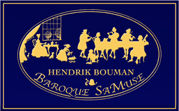In music, as in other activities, there are times for learning new things, new skills, new expressions; there are also times that we simply seem to repeat over and over our last achievements in the hope that they stabilise in us, become natural like walking, or chewing. The times of progress do not necessarily depend on an external push, but rather on an inner state of receptivity, an awakened awareness for new elements, an expanding quality in hearing. From the moment we sense ourselves searching, we are making ourselves ready to include new dimensions and to attain higher forms of personal perfection.
One can train oneself to be sensitive to such an awakened state, even to create favourable conditions. It is worthwhile to aspire for this receptivity every time one makes music. Without it, one is quite normally subject to various fluctuations, due to the complex interactive play within one's own being - thoughts, feelings, physical state - and between oneself and external conditions with their projections both ways.
But even after great mastery, progress will never be under our complete command and periods without obvious advance can be long and involuntary, in spite of our efforts. The external signs, however, often do not express the inner incubation, and the paths to be hewn for new developments are not necessarily related to music matters directly. The more we know ourselves and the more key points we have vigilantly set out for ourselves, the less chance is there for progress being wasted by a lack of consciousness, or distraction or through fear.
Yet, everyone knows those moments of grace, in which we suddenly experience our own skills in another light, discovering ourselves almost as if there was another person within, witnessing our outer self being carried up into new realms. I remember a vocal student reporting: “Suddenly I heard my voice as from outside, and for a moment this voice did not seem to belong to me; I sounded like a real singer.” These moments mark a step in personal mastery, which tend to stay in one's memory. They carry their own subjective truth and do not necessarily correspond to external criteria. Our past efforts seem to be wrapped up at once into one integrating experience, a concept, a sonority, a rhythmical gesture, a motoric combination, always accompanied by a conscious sense of truth, and in that deep sense, a déjà-vu, a recognition of a higher Essence manifesting through our own endeavours (hence the temporary double-selfness and the hesitation to appropriate the experience as one's own). A freely evolving child goes frequently and with enthusiasm through these 'prises-de-conscience' without experiencing any






